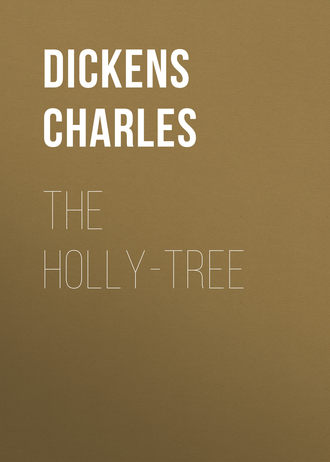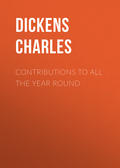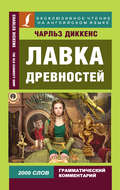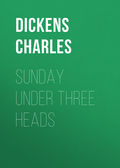
Чарльз Диккенс
The Holly-Tree
In the morning I found that it was snowing still, that it had snowed all night, and that I was snowed up. Nothing could get out of that spot on the moor, or could come at it, until the road had been cut out by labourers from the market-town. When they might cut their way to the Holly-Tree nobody could tell me.
It was now Christmas-eve. I should have had a dismal Christmas-time of it anywhere, and consequently that did not so much matter; still, being snowed up was like dying of frost, a thing I had not bargained for. I felt very lonely. Yet I could no more have proposed to the landlord and landlady to admit me to their society (though I should have liked it – very much) than I could have asked them to present me with a piece of plate. Here my great secret, the real bashfulness of my character, is to be observed. Like most bashful men, I judge of other people as if they were bashful too. Besides being far too shamefaced to make the proposal myself, I really had a delicate misgiving that it would be in the last degree disconcerting to them.
Trying to settle down, therefore, in my solitude, I first of all asked what books there were in the house. The waiter brought me a Book of Roads, two or three old Newspapers, a little Song-Book, terminating in a collection of Toasts and Sentiments, a little Jest-Book, an odd volume of Peregrine Pickle, and the Sentimental Journey. I knew every word of the two last already, but I read them through again, then tried to hum all the songs (Auld Lang Syne was among them); went entirely through the jokes, – in which I found a fund of melancholy adapted to my state of mind; proposed all the toasts, enunciated all the sentiments, and mastered the papers. The latter had nothing in them but stock advertisements, a meeting about a county rate, and a highway robbery. As I am a greedy reader, I could not make this supply hold out until night; it was exhausted by tea-time. Being then entirely cast upon my own resources, I got through an hour in considering what to do next. Ultimately, it came into my head (from which I was anxious by any means to exclude Angela and Edwin), that I would endeavour to recall my experience of Inns, and would try how long it lasted me. I stirred the fire, moved my chair a little to one side of the screen, – not daring to go far, for I knew the wind was waiting to make a rush at me, I could hear it growling, – and began.
My first impressions of an Inn dated from the Nursery; consequently I went back to the Nursery for a starting-point, and found myself at the knee of a sallow woman with a fishy eye, an aquiline nose, and a green gown, whose specially was a dismal narrative of a landlord by the roadside, whose visitors unaccountably disappeared for many years, until it was discovered that the pursuit of his life had been to convert them into pies. For the better devotion of himself to this branch of industry, he had constructed a secret door behind the head of the bed; and when the visitor (oppressed with pie) had fallen asleep, this wicked landlord would look softly in with a lamp in one hand and a knife in the other, would cut his throat, and would make him into pies; for which purpose he had coppers, underneath a trap-door, always boiling; and rolled out his pastry in the dead of the night. Yet even he was not insensible to the stings of conscience, for he never went to sleep without being heard to mutter, “Too much pepper!” which was eventually the cause of his being brought to justice. I had no sooner disposed of this criminal than there started up another of the same period, whose profession was originally house-breaking; in the pursuit of which art he had had his right ear chopped off one night, as he was burglariously getting in at a window, by a brave and lovely servant-maid (whom the aquiline-nosed woman, though not at all answering the description, always mysteriously implied to be herself). After several years, this brave and lovely servant-maid was married to the landlord of a country Inn; which landlord had this remarkable characteristic, that he always wore a silk nightcap, and never would on any consideration take it off. At last, one night, when he was fast asleep, the brave and lovely woman lifted up his silk nightcap on the right side, and found that he had no ear there; upon which she sagaciously perceived that he was the clipped housebreaker, who had married her with the intention of putting her to death. She immediately heated the poker and terminated his career, for which she was taken to King George upon his throne, and received the compliments of royalty on her great discretion and valour. This same narrator, who had a Ghoulish pleasure, I have long been persuaded, in terrifying me to the utmost confines of my reason, had another authentic anecdote within her own experience, founded, I now believe, upon Raymond and Agnes, or the Bleeding Nun. She said it happened to her brother-in-law, who was immensely rich, – which my father was not; and immensely tall, – which my father was not. It was always a point with this Ghoul to present my clearest relations and friends to my youthful mind under circumstances of disparaging contrast. The brother-in-law was riding once through a forest on a magnificent horse (we had no magnificent horse at our house), attended by a favourite and valuable Newfoundland dog (we had no dog), when he found himself benighted, and came to an Inn. A dark woman opened the door, and he asked her if he could have a bed there. She answered yes, and put his horse in the stable, and took him into a room where there were two dark men. While he was at supper, a parrot in the room began to talk, saying, “Blood, blood! Wipe up the blood!” Upon which one of the dark men wrung the parrot’s neck, and said he was fond of roasted parrots, and he meant to have this one for breakfast in the morning. After eating and drinking heartily, the immensely rich, tall brother-in-law went up to bed; but he was rather vexed, because they had shut his dog in the stable, saying that they never allowed dogs in the house. He sat very quiet for more than an hour, thinking and thinking, when, just as his candle was burning out, he heard a scratch at the door. He opened the door, and there was the Newfoundland dog! The dog came softly in, smelt about him, went straight to some straw in the corner which the dark men had said covered apples, tore the straw away, and disclosed two sheets steeped in blood. Just at that moment the candle went out, and the brother-in-law, looking through a chink in the door, saw the two dark men stealing up-stairs; one armed with a dagger that long (about five feet); the other carrying a chopper, a sack, and a spade. Having no remembrance of the close of this adventure, I suppose my faculties to have been always so frozen with terror at this stage of it, that the power of listening stagnated within me for some quarter of an hour.
These barbarous stories carried me, sitting there on the Holly-Tree hearth, to the Roadside Inn, renowned in my time in a sixpenny book with a folding plate, representing in a central compartment of oval form the portrait of Jonathan Bradford, and in four corner compartments four incidents of the tragedy with which the name is associated, – coloured with a hand at once so free and economical, that the bloom of Jonathan’s complexion passed without any pause into the breeches of the ostler, and, smearing itself off into the next division, became rum in a bottle. Then I remembered how the landlord was found at the murdered traveller’s bedside, with his own knife at his feet, and blood upon his hand; how he was hanged for the murder, notwithstanding his protestation that he had indeed come there to kill the traveller for his saddle-bags, but had been stricken motionless on finding him already slain; and how the ostler, years afterwards, owned the deed. By this time I had made myself quite uncomfortable. I stirred the fire, and stood with my back to it as long as I could bear the heat, looking up at the darkness beyond the screen, and at the wormy curtains creeping in and creeping out, like the worms in the ballad of Alonzo the Brave and the Fair Imogene.
There was an Inn in the cathedral town where I went to school, which had pleasanter recollections about it than any of these. I took it next. It was the Inn where friends used to put up, and where we used to go to see parents, and to have salmon and fowls, and be tipped. It had an ecclesiastical sign, – the Mitre, – and a bar that seemed to be the next best thing to a bishopric, it was so snug. I loved the landlord’s youngest daughter to distraction, – but let that pass. It was in this Inn that I was cried over by my rosy little sister, because I had acquired a black eye in a fight. And though she had been, that Holly-Tree night, for many a long year where all tears are dried, the Mitre softened me yet.
“To be continued to-morrow,” said I, when I took my candle to go to bed. But my bed took it upon itself to continue the train of thought that night. It carried me away, like the enchanted carpet, to a distant place (though still in England), and there, alighting from a stage-coach at another Inn in the snow, as I had actually done some years before, I repeated in my sleep a curious experience I had really had there. More than a year before I made the journey in the course of which I put up at that Inn, I had lost a very near and dear friend by death. Every night since, at home or away from home, I had dreamed of that friend; sometimes as still living; sometimes as returning from the world of shadows to comfort me; always as being beautiful, placid, and happy, never in association with any approach to fear or distress. It was at a lonely Inn in a wide moorland place, that I halted to pass the night. When I had looked from my bedroom window over the waste of snow on which the moon was shining, I sat down by my fire to write a letter. I had always, until that hour, kept it within my own breast that I dreamed every night of the dear lost one. But in the letter that I wrote I recorded the circumstance, and added that I felt much interested in proving whether the subject of my dream would still be faithful to me, travel-tired, and in that remote place. No. I lost the beloved figure of my vision in parting with the secret. My sleep has never looked upon it since, in sixteen years, but once. I was in Italy, and awoke (or seemed to awake), the well-remembered voice distinctly in my ears, conversing with it. I entreated it, as it rose above my bed and soared up to the vaulted roof of the old room, to answer me a question I had asked touching the Future Life. My hands were still outstretched towards it as it vanished, when I heard a bell ringing by the garden wall, and a voice in the deep stillness of the night calling on all good Christians to pray for the souls of the dead; it being All Souls’ Eve.
To return to the Holly-Tree. When I awoke next day, it was freezing hard, and the lowering sky threatened more snow. My breakfast cleared away, I drew my chair into its former place, and, with the fire getting so much the better of the landscape that I sat in twilight, resumed my Inn remembrances.
That was a good Inn down in Wiltshire where I put up once, in the days of the hard Wiltshire ale, and before all beer was bitterness. It was on the skirts of Salisbury Plain, and the midnight wind that rattled my lattice window came moaning at me from Stonehenge. There was a hanger-on at that establishment (a supernaturally preserved Druid I believe him to have been, and to be still), with long white hair, and a flinty blue eye always looking afar off; who claimed to have been a shepherd, and who seemed to be ever watching for the reappearance, on the verge of the horizon, of some ghostly flock of sheep that had been mutton for many ages. He was a man with a weird belief in him that no one could count the stones of Stonehenge twice, and make the same number of them; likewise, that any one who counted them three times nine times, and then stood in the centre and said, “I dare!” would behold a tremendous apparition, and be stricken dead. He pretended to have seen a bustard (I suspect him to have been familiar with the dodo), in manner following: He was out upon the plain at the close of a late autumn day, when he dimly discerned, going on before him at a curious fitfully bounding pace, what he at first supposed to be a gig-umbrella that had been blown from some conveyance, but what he presently believed to be a lean dwarf man upon a little pony. Having followed this object for some distance without gaining on it, and having called to it many times without receiving any answer, he pursued it for miles and miles, when, at length coming up with it, he discovered it to be the last bustard in Great Britain, degenerated into a wingless state, and running along the ground. Resolved to capture him or perish in the attempt, he closed with the bustard; but the bustard, who had formed a counter-resolution that he should do neither, threw him, stunned him, and was last seen making off due west. This weird main, at that stage of metempsychosis, may have been a sleep-walker or an enthusiast or a robber; but I awoke one night to find him in the dark at my bedside, repeating the Athanasian Creed in a terrific voice. I paid my bill next day, and retired from the county with all possible precipitation.
That was not a commonplace story which worked itself out at a little Inn in Switzerland, while I was staying there. It was a very homely place, in a village of one narrow zigzag street, among mountains, and you went in at the main door through the cow-house, and among the mules and the dogs and the fowls, before ascending a great bare staircase to the rooms; which were all of unpainted wood, without plastering or papering, – like rough packing-cases. Outside there was nothing but the straggling street, a little toy church with a copper-coloured steeple, a pine forest, a torrent, mists, and mountain-sides. A young man belonging to this Inn had disappeared eight weeks before (it was winter-time), and was supposed to have had some undiscovered love affair, and to have gone for a soldier. He had got up in the night, and dropped into the village street from the loft in which he slept with another man; and he had done it so quietly, that his companion and fellow-labourer had heard no movement when he was awakened in the morning, and they said, “Louis, where is Henri?” They looked for him high and low, in vain, and gave him up. Now, outside this Inn, there stood, as there stood outside every dwelling in the village, a stack of firewood; but the stack belonging to the Inn was higher than any of the rest, because the Inn was the richest house, and burnt the most fuel. It began to be noticed, while they were looking high and low, that a Bantam cock, part of the live stock of the Inn, put himself wonderfully out of his way to get to the top of this wood-stack; and that he would stay there for hours and hours, crowing, until he appeared in danger of splitting himself. Five weeks went on, – six weeks, – and still this terrible Bantam, neglecting his domestic affairs, was always on the top of the wood-stack, crowing the very eyes out of his head. By this time it was perceived that Louis had become inspired with a violent animosity towards the terrible Bantam, and one morning he was seen by a woman, who sat nursing her goître at a little window in a gleam of sun, to catch up a rough billet of wood, with a great oath, hurl it at the terrible Bantam crowing on the wood-stack, and bring him down dead. Hereupon the woman, with a sudden light in her mind, stole round to the back of the wood-stack, and, being a good climber, as all those women are, climbed up, and soon was seen upon the summit, screaming, looking down the hollow within, and crying, “Seize Louis, the murderer! Ring the church bell! Here is the body!” I saw the murderer that day, and I saw him as I sat by my fire at the Holly-Tree Inn, and I see him now, lying shackled with cords on the stable litter, among the mild eyes and the smoking breath of the cows, waiting to be taken away by the police, and stared at by the fearful village. A heavy animal, – the dullest animal in the stables, – with a stupid head, and a lumpish face devoid of any trace of insensibility, who had been, within the knowledge of the murdered youth, an embezzler of certain small moneys belonging to his master, and who had taken this hopeful mode of putting a possible accuser out of his way. All of which he confessed next day, like a sulky wretch who couldn’t be troubled any more, now that they had got hold of him, and meant to make an end of him. I saw him once again, on the day of my departure from the Inn. In that Canton the headsman still does his office with a sword; and I came upon this murderer sitting bound, to a chair, with his eyes bandaged, on a scaffold in a little market-place. In that instant, a great sword (loaded with quicksilver in the thick part of the blade) swept round him like a gust of wind or fire, and there was no such creature in the world. My wonder was, not that he was so suddenly dispatched, but that any head was left unreaped, within a radius of fifty yards of that tremendous sickle.






